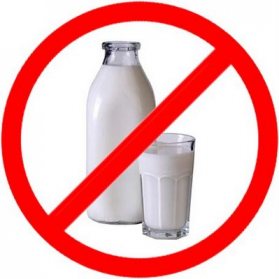Milk: Doesn’t Do a Body Good!
I don’t drink milk. Every time I mention this to someone, I feel like I’m uttering blasphemy. However, based on the research that’s now out there and my own clinical experience, I can no longer deny that milk isn’t doing my body any good!
I often ask my patients to think about it for a minute. If milk is vital for health, why are we the only species on Earth that continues to consume it for our entire lives?! If it’s so beneficial, why don’t the other species consume it beyond infancy?
It really just comes down to the fact that humans are not meant to digest milk on a regular basis. Most of us stop producing significant amounts of lactase (enzyme required to properly metabolize the lactose in milk) between the ages of two and five years old. This is our body’s natural way of telling us we should no longer be consuming this product!
You don’t have to just take my word for it. Dr. Walter Willet, M.D., Ph.D. (the second most cited scientist in all of clinical medicine and head of nutrition at Harvard’s School of Public Health) has done many studies that prove milk not only isn’t good for you but may actually be harmful. Some of the findings are as follows:
- Most people can’t digest milk! Unfortunately, approximately 75% of the human population is genetically unable to properly digest milk and other dairy products(i).
- Less dairy, better bones! Research has shown us that countries with the lowest rates of dairy and calcium consumption actually have the lowest rates of osteoporosis.
- Calcium doesn’t protect our bones as we are led to believe! Studies of calcium supplementation indicate no benefit in reducing the risk of fractures (ii). On the contrary, vitamin D appears to be much more important in regards to preventing fractures than calcium.
- Calcium may raise the risk of certain cancers! Research now shows that higher intakes of calcium and dairy products may increase the risk of prostate cancer by 30% – 50% (iii). Dairy consumption also increases our body’s level of insulin-like growth factor-1 (IGF-1), which is a known cancer promoter!
Milk is ‘supposed’ to be good for us because it is a source for three main nutrients – calcium, potassium, and vitamin D. However, most research now indicates that it is better for us to get this calcium, potassium, and vitamin D from other products such as vegetables, fruits, beans, whole grains, nuts, and seeds. These foods are a better alternative because according to the latest medical research, milk is linked to a number of health issues including allergies, cancer, sinus problems, ear infections, diabetes, anemia, and IBS to name just a few.
If you’re not already reconsidering milk, it just gets worse. So basically we are programmed into thinking that we need milk to get beneficial nutrients into our bodies, right? Well, what if I told you that pasteurized milk is basically void of most of these beneficial properties?! The pasteurization process is designed to kill off all pathogens in milk and in the process, it kills off all the beneficial bacteria and digestive enzymes as well. We require these to maintain a strong immune system and to properly digest lactose. Pasteurization also destroys a significant amount of the vitamin content in milk including vitamins C, B6, and B12, and it alters the chemical state and absorption of calcium and other minerals. Does it make sense to drink a product that is linked to so many health issues when it doesn’t really provide us with much nutritionally? And I’m not going to even get started on all the antibiotics, growth hormone and other toxins that are found in conventional milk! To me, milk seems to be doing more harm than good!
Why not try a milk alternative next time you’re in the grocery store? I like both rice milk and almond milk – they’re great tasting and much healthier alternatives. Give it a try – you might just rethink milk, too!
References:
(i) Brannon PM, Carpenter TO, Fernandez JR, Gilsanz V, Gould JB, Hall KE, Hui SL, Lupton JR, Mennella J, Miller NJ, Osganian SK, Sellmeyer DE, Suchy FJ, Wolf MA. NIH Consensus Development Conference Statement: Lactose Intolerance and Health. NIH Consens State Sci Statements. 2010 Feb 24;27(2).
(ii) Feskanich D, Willett WC, Colditz GA. Calcium, vitamin D, milk consumption, and hip fractures: a prospective study among postmenopausal women. Am J Clin Nutr. 2003 Feb;77(2):504-11.
(iii) Tseng M, Breslow RA, Graubard BI, Ziegler RG. Dairy, calcium, and vitamin D intakes and prostate cancer risk in the National Health and Nutrition Examination Epidemiologic Follow-up Study cohort. Am J Clin Nutr. 2005 May;81(5):1147-54.

